While I was living and working in Morocco, I spontaneously booked tickets to Addis Ababa, determined to explore sub-Saharan Africa more. In my two weeks trouncing around Ethiopia with little preparation beforehand, I quickly encountered a steep learning curve as a solo female traveler. If you’re planning a solo trip to Ethiopia soon, check out the below tips on how to maximize your experience safely.
Things to Do as a Solo Female Traveler in Ethiopia
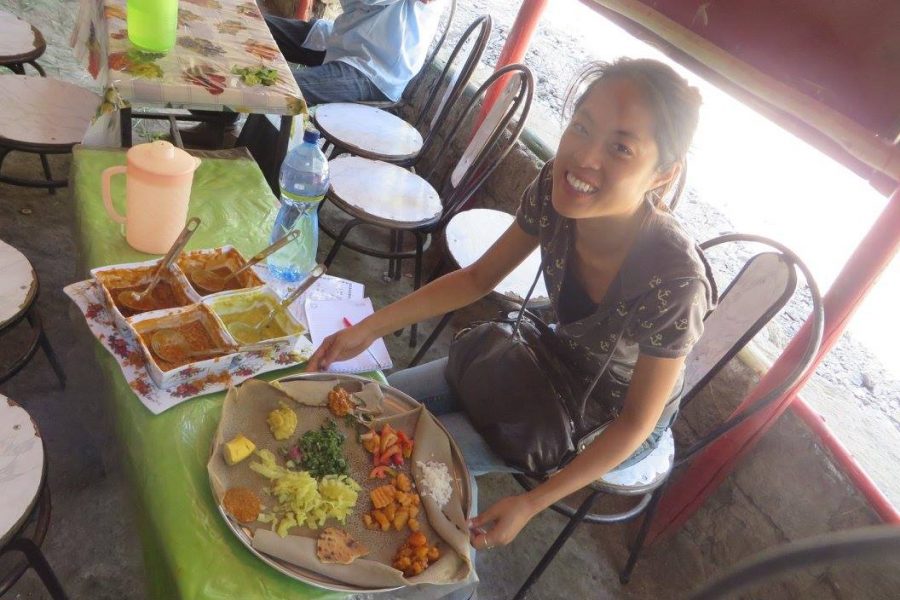
1. Do prepare yourself for a lot of attention
Ethiopia — although rising in status as an economic powerhouse for Eastern Africa — still isn’t one of the more frequently-visited and touristy African nations, such as South Africa or Kenya. Particularly outside of Addis Ababa, locals aren’t used to seeing non-black people.
With that understanding, I noted a steady stream of street harassment and attention as an obvious foreigner following me everywhere I went. Sometimes it was noises that locals believed were words in an Asian language, other times crowds of young men were leering and openly staring.
2. Do take part in shoulder dancing
Ethiopia’s traditional dance is popularized in cultural restaurants where this high-energy dance, “eskista”, is performed by professionals on stage.
The shoulder dance is exactly what it sounds like: a physically exhaustive series of shoulder pumping movements where their frequent up and down action can almost be dizzying to watch too closely. The dancers keep their shoulder bounces in tune to the music, arms at their side, as the onlookers clap in time.
Be ready: right when a spectator’s guard is down, the dancers come and pull them up to participate on stage.
3. Do brace yourself for intense bus rides
Domestic flights are an option for anyone going from Addis Ababa to farther destinations, such as Lalibela or Gondar (which is what I did). However, to save money or go shorter distances, take note that road conditions aren’t stellar, and bumps and frequent breaks are common.
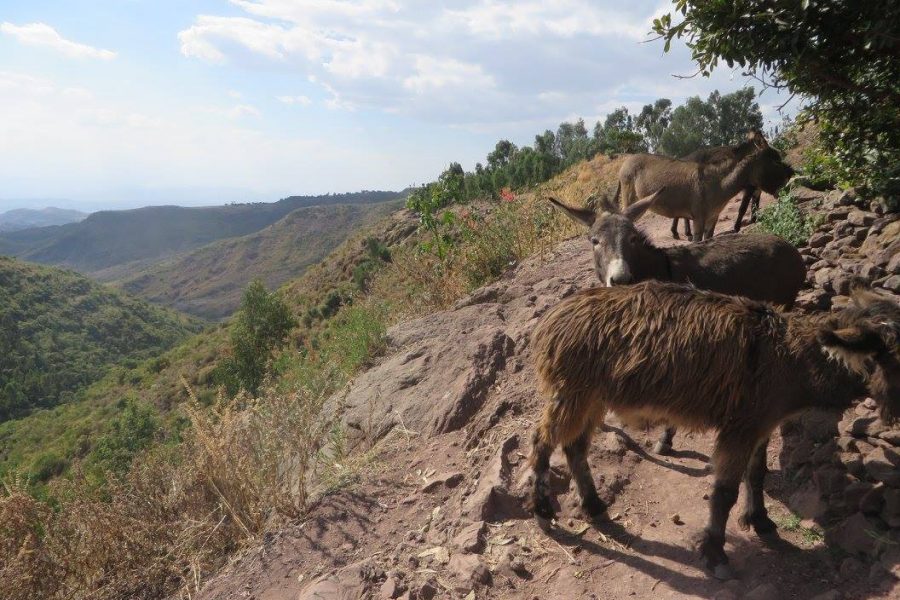
If you’re ready for hours of Ethiopian music (which is repetitive by nature), then you can leave the ear plugs at home, otherwise a pair will make it more tolerable. Like many other African countries I’ve traveled to, oftentimes locals aren’t that accustomed to long rides, so drivers would have to take rest stops frequently for nauseous passengers. If you’re lucky, they manage to hold it until they are outside of the bus.
Pack snacks for the journey, as I found that venturing off the bus in smaller villages that acted as rest stops meant I was a magnet for harassment and attention even more severely than the larger towns.
On one long bus ride, I lost any motivation to exit the bus after a few grating rest breaks. A young girl that sat behind me noticed that I was one of the only people not to get off, and graciously surprised me with a pack of crackers from the street vendors.

4. Do visit Lucy in Addis Ababa
Although I found it to be generally a crowded, congested cosmopolitan city with noise and people every way you turn, Addis Ababa offers a few attractions worth visiting.
One of them is the original remains of Lucy, the most complete skeleton of our earliest human ancestor originally discovered in Ethiopia. Lucy sits well-kept in the National Museum. A plaster replica is the one on display for the public, and although the museum itself has more than its fair share of dusty shelves and yellowed paper descriptions of its displays, it was worth it to lay my eyes on such a historic symbol of our species.
The museum is also easy to locate and costs just 25 ETB to enter.
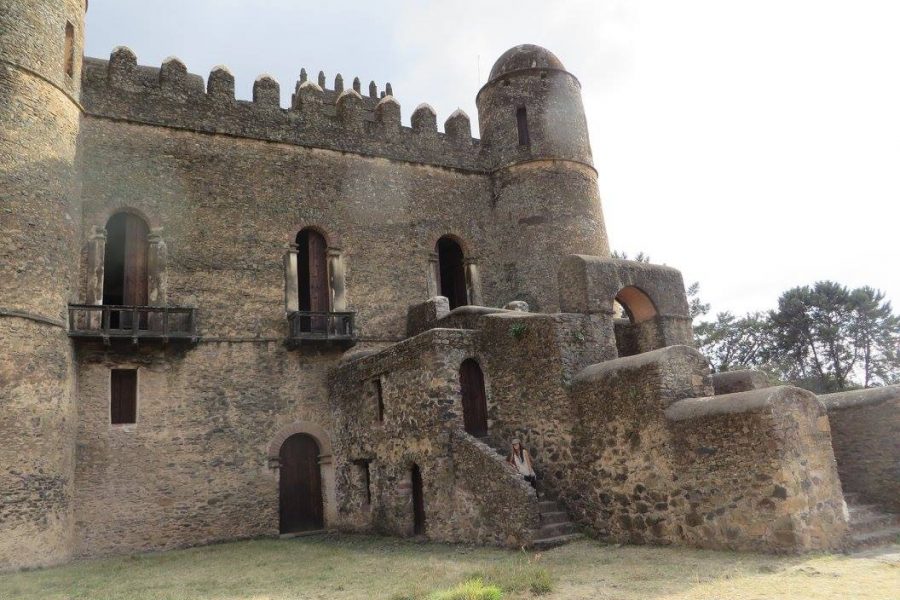
5. Do embrace Ethiopian generosity
Something which continued to surprise me throughout my trip was the outpouring of warmth in the most unexpected places.
I was wandering around the town of Arba Minch by myself one evening; it’s a small town bordering Abaya Lake where I planned to take a tour to see flamingos, hippos, and crocodiles the next day. A young one-armed man in our hotel lobby started speaking to me in English, and then ended up challenging me to a game of billiards.
Unable to resist, I accepted and followed him to a pool hall. Naturally, I lost, but he graciously invited me to go out to dinner with him and his coach, as I discovered he was a Paralympics athlete doing a tour in Africa. The two of them took me to a local restaurant and ordered strips of goat, deliciously cooked over a small coal table oven. Afterwards, we went on a walk around the town and his girlfriend invited me over to her home for tea.
In that same part of my voyage, I took a local bus from Arba Minch to the famous Chencha market, a massive gathering of local farmers twice a week, selling locally-grown vegetables to any of the nearby villages. I befriended a young Australian girl on the way, and together we strolled around the spread of Ethiopians baking in the sun, sitting on their square mats, and displaying their wares.
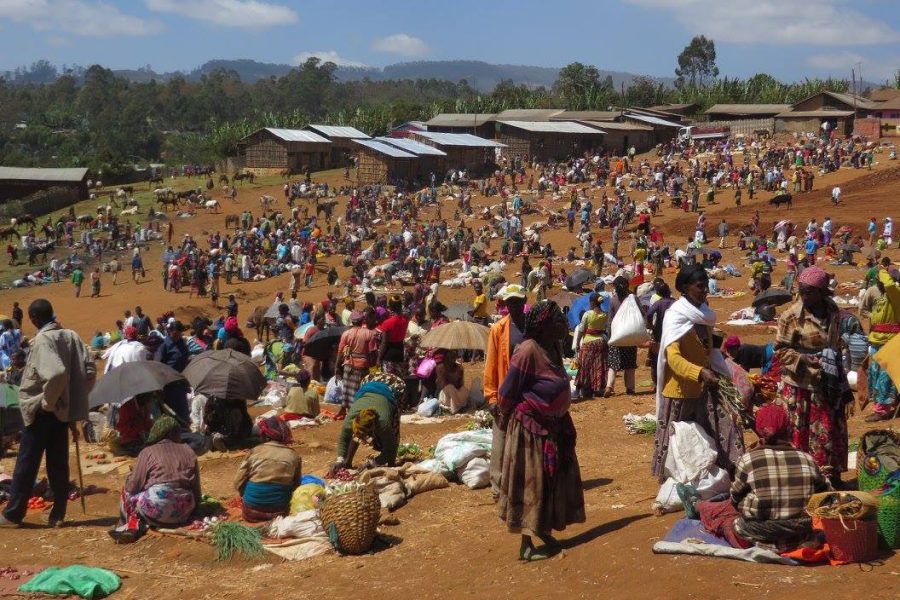
On the way back, however, we discovered that the last bus stopped running an hour before. It was still light out as we pondered what to do, knowing that paying a taxi to drive us the whole way wouldn’t be cheap for two foreign females, nor particularly safe.
We were standing by a small cafe on the roadside, feeling like we were running out of options, when we saw a truck stop and chat with a group of men next to us. We overheard them discussing how they would fit in the back, and I asked if they were heading towards Arba Minch. “Sure, do you need a ride? We are professors at a school there, going back after the weekend at home here.” One of the men, surprising us with his English, gestured for us to jump in the back of the truck and, without hesitation, we followed suit.
We had a lighthearted conversation with the teachers all the way back to town, sitting shoulder-to-shoulder in the covered truck bed. We learned about the education system in Ethiopia and felt grateful to have met them.
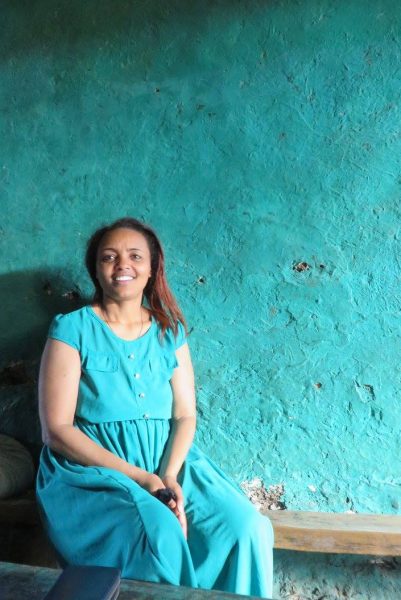
6. Do feed the hyenas of Harar
When I got off a long, creaky bus ride from Addis Ababa to the eastern town of Harar, I was lucky enough to have timed my arrival for sundown, since this is when I’d read that the hyenas are called into town.
I followed local directions and stood looking out at the edge of town towards a dirt road sloping downhill. I couldn’t see any animals roaming around, but a lone middle-aged local assured me they’d come.
After collecting a small fee from me and the handful of other foreigners who’d turned up by nightfall, he and an assistant took out a bucket of raw leftover meat from the local butcher’s shop. The hyena-whisperer stepped towards the darkness and emitted an eerily high-pitched series of wails, repeating them with higher and lower tones, as the rest of us watched in tense, anticipatory silence.
After a few minutes, a lone silhouette appeared, loping slowly right up to the man who had a slab of meat in his arm. He threw it on the ground, and as the hyena wolfed it down, a second smaller hyena appeared.
After watching them eat for a few minutes, the man said something in Amharic to the crowd, but I didn’t understand and no one else seemed to react. Finally, he beckoned me over with a finger and gave me a stick the length of a glowstick. He gestured for me to get on my knees, and positioned the stick in my mouth.
Just as I pieced together what was happening, he hooked a small piece of meat onto the end of the stick and whistled.
I immediately felt a hyena’s front paws push off my back. In an instant, he stretched around my head and gulped down the piece of meat dangling off the stick, inches from my face.
Unaware of my bewilderment as I shakily stood back up and moved out of the center, he called over another foreign “volunteer”. It’s still a surreal moment, which passed all too quickly, that I hold dear to this day.
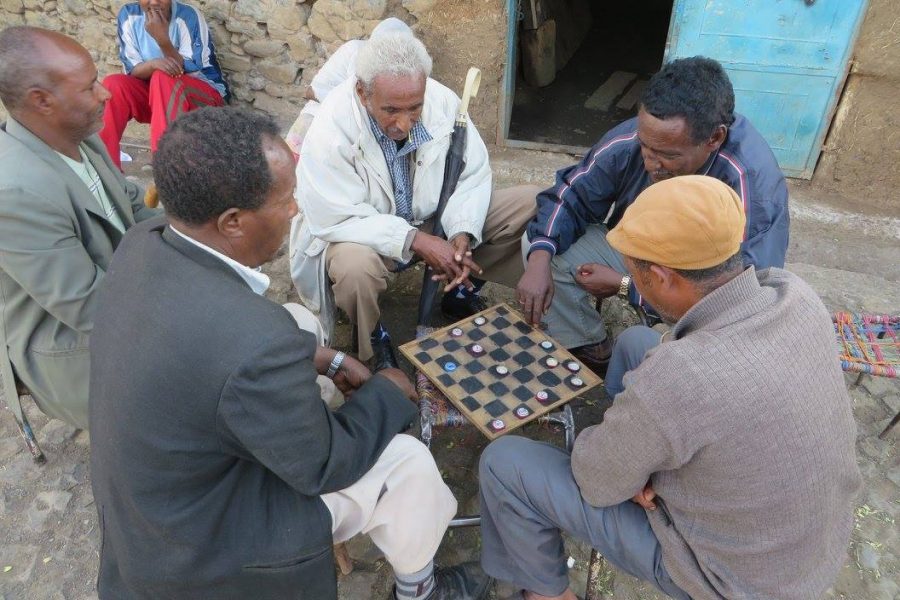
But Don’t Do These Things in Ethiopia
1. Don’t have high language expectations
Ethiopia was one of the few countries in Africa to have never been colonized by a European power. The local language, Amharic, is predominantly used in the entire country with very small traces of English, French, German, or any other European or Western language.
I encountered sporadic traces of Italian influence, such as restaurants serving pasta on top of injera bread. I also met a handful of half-Italian-half-Ethiopians who were excited when I mentioned I was Asian-American (“So your mother is Asian and your father is American? You’re mixed like us?!”) until I gently corrected them.
Moreover, the alphabet used is unique to Amharic in Ethiopia. In more than one conversation, I heard references to it looking like “alien writing” and it was an adjustment to see signs scrawled with these characters in place of any other alphabet I’d encountered before.
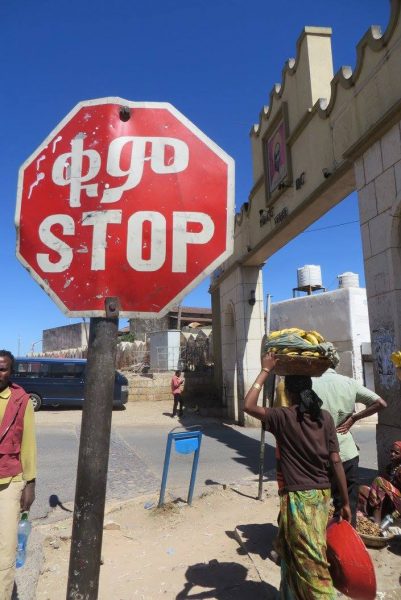
2. Don’t shy away from befriending the locals
Language barrier aside, I’ve always loved getting to chat with as many locals as I can when in a new country. During a power outage in my hotel in Arba Minch, I walked out of my room to find the hotel staff sharing a meal over injera bread on the ground of the lobby. Without any words, they motioned for me to join them, and by candle light, we ate together, in a gesture of silent hospitality.
Another instance where I really felt the heart and soul of Ethiopian goodwill was on my first evening in Harar. I had spent much of the 10-hour bus ride speaking with an older gentleman next to me and he offered to walk around with me looking for a hotel with a vacancy. When we didn’t find any, he invited me to stay at his home with his family. Following my gut instincts to trust him, I accepted. After dropping off my things at his home, he took me and his son out to dinner, refusing any payment for the meal.
I slept on the floor of the living room on cushions alongside his wife and mother, while he and his son slept in an adjacent room. The next morning, he even invited me to his son’s university graduation (which unfortunately I had to decline).
I made the effort to visit him once more after the hyena-feeding evening, and while we lost touch afterwards, I hope to pay forward his kindness one day.

3. Don’t lower your guard in tuk-tuks
Riding in a taxi, as a single female, is always a roll of the dice in a foreign country. The taxis of Ethiopia, especially outside of the major cities, came in the form of three-wheeled tuk-tuks that I frequently used to get around.
One evening, an acquaintance called me a tuk-tuk to go from a restaurant on one side of town where we’d just finished eating to the other side where my hostel was. As I jumped in, I vaguely recall seeing — through the pitch darkness — that there were two men in front instead of just one driver.
Alarm bells started going off in my head the second the driver (and his friend, apparently) slowed down to let another man in the back seat.
I tried to ask if he was also a passenger going the same direction, but they didn’t understand, or pretended not to, and we turned around the mountain to where the darkness was suffocating.
The man in the back inched closer to me and immediately started groping me, his hands taking advantage of the obscurity of our road. I elbowed him and shoved him away, shouting for the driver to stop, but no one responded. My backseat companion continued to reach towards me as I battled him for what felt like an eternity. I briefly debated rolling out of the tuktuk but also knew that I would have literally no idea where I was.
As I weighed the choices ahead of me, miraculously, we pulled to a stop in front of my hotel. I bolted and threw the money at my hotel receptionist to give to them as I sought refuge in my room, locking the door and immediately taking a hot shower to re-find my sense of security again.
4. Don’t underestimate the power of a child’s companionship
On Christmas Day, I made it to Lalibela, a town famous for its beautiful stone churches carved into the ground. As I marveled at the massive structures and their intricate window designs, a group of 8-year-old boys approached me to sign their petition for sponsors to buy them a new football.
When I took the paper, their eyes lit up with hope, but when I returned it with grammar corrections, they chattered excitedly to one another in Amharic then started inquiring more about me, in broken English.
As we wandered around town, they pointed out their school friends and the local shopkeepers they knew. Our crowd grew, particularly when one boy wanted me to meet his mother so we stopped in one of their huts off the road where the neighbors stared wide-eyed.
His relatives immediately cleared out, and gave me their best cushion, insisting I wait patiently as they made me tea. The fire in the tiny conical space made the already warm temperature even stuffier. As I waited, the grandmother took my hand, enclosing in it a rope necklace with a wooden cross, speaking in Amharic. Though she must have known I didn’t understand a word, I thanked them all for their gracious welcome.
By this point, we had collected more kids from the neighborhood. As I strolled towards a restaurant for dinner, they taught me local Christmas songs, singing in unison at the top of their lungs.
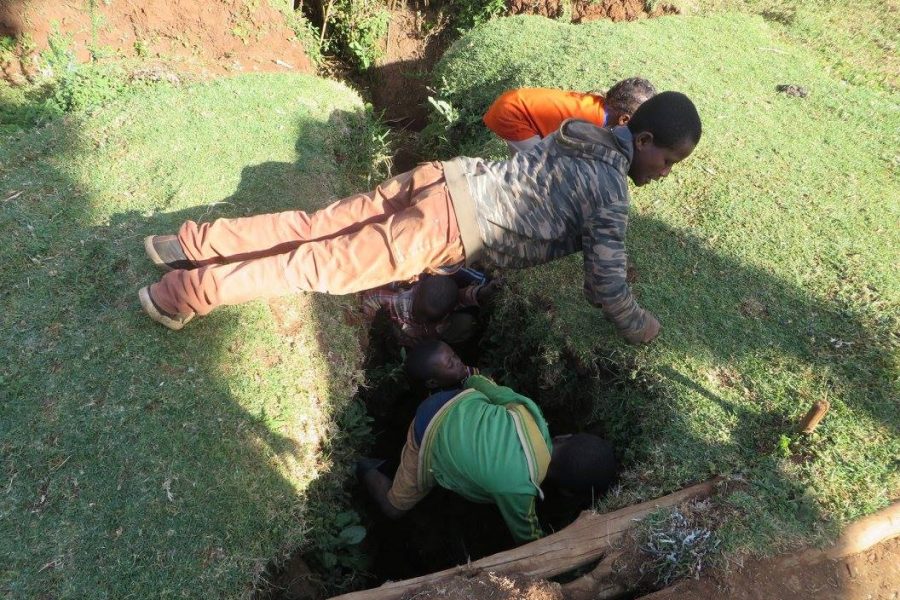
When the hostess at the restaurant seated me, the kids all vanished suddenly. I looked around, confused, and she explained that they wanted to leave me in peace to eat without feeling like I had to feed all nine of them as well. For them, my companionship was enough.
Like true gentlemen, the boys waited outside, and stood with me until my tuk-tuk driver showed up. As we pulled away, they waved and shouted their goodbyes, leaving me with the burning memories of the sweetest Christmas gift I could have hoped for.































